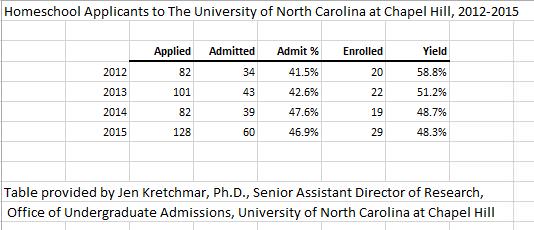

As the homeschooling movement grows in size and stature, many parents remain anxious about how their children will fare in the competitive world of college admissions, especially at selective institutions. Are homeschool students at a disadvantage relative to their peers from traditional backgrounds? Or are they winning over once-wary admissions officers with their customized curricula and unconventional resumés?
“In the past 20 years homeschool kids have proven themselves,” says Allison Dod, a homeschooling parent and former public school teacher. Now, she says, “Colleges are pretty receptive to homeschoolers.”
She would know: last year her oldest son Daniel was admitted to Duke University, The University of North Carolina at Chapel Hill, and NC State University. A freshman at NC State, Daniel was homeschooled from 2nd through 10th grade. For his junior and senior years of high school, he attended the public magnet program, Middle College High School at Durham Technical Community College, earning 44 credits; NC State has accepted 40 of those credits, catapulting him far ahead of most other first-year students.
Matt Williams, a UNC-Chapel Hill freshman, was homeschooled from kindergarten all the way through 12th grade. Throughout high school, he enrolled in online classes through The Potter’s School, a virtual program popular with homeschoolers. During his junior and senior years, he completed four community college courses, two in science and two in mathematics. “I knocked out all of my science requirements for UNC through those classes and I got one of my math credits,” says Williams.
Williams describes his family’s homeschooling credo thus: “Try to hone in on one area that you’re good at.” For Williams, that area of specialization was debate, a passion he pursued through tournaments hosted by the National Christian Forensics and Communications Association. For his senior project, he taught a bi-weekly speech and debate class to inner-city students in his hometown of Greenville, NC.
At North Carolina’s colleges and universities, it’s a level playing field
Such anecdotal success stories are heartening, but are they indicative of a broader level of acceptance in the hallowed halls of higher education? Homeschoolers today are earning admission to some of the state’s most selective institutions. The caveat, of course, is this: admission for all students at these selective schools is highly and increasingly competitive, requiring strong evidence of academic achievement.
At UNC-Chapel Hill’s Office of Undergraduate Admissions, Senior Assistant Director of Admissions Ashley Memory says of homeschoolers, “They actually fare very well. What we’re seeing are applicants who recognize they’re coming from a non-traditional program. Many times,” says Memory, “we see them seeking out opportunities beyond” their home academic environment, including online or AP classes, and to some degree, dual enrollment programs. Dual enrollment, says Memory, helps students understand what the rigors of college coursework would be like.
Data provided by Dr. Jen Kretchmar, senior assistant director of research at UNC-Chapel Hill’s Office of Undergraduate Admissions, show that the university admitted 42 to 48 percent of all homeschool applicants (in- and out-of-state) in each of the years between 2012 and 2015. During this time, the number of homeschoolers seeking admission to UNC-Chapel Hill has fluctuated somewhat, but has remained in the range of 80 to 130 applicants each year.
At Davidson College, David Kraus, director of admission, says homeschool applicants can expect a holistic review, just like other applicants. “We consider every application individually,” says Kraus, who receives and reads 60 to 80 applications annually from homeschool students.
How can homeschool applicants to Davidson position themselves well? “The best homeschool application gives us a number of vehicles with which to assess the academic achievement,” says Kraus. “Many have taken AP coursework,” says Kraus, adding, “We also see students who are dually enrolled” in community college classes. Straight As on a homeschool transcript are validated by strong testing, notes Kraus. Homeschoolers should expect to submit scores from several assessments: the typical applicant, says Kraus, sends “two or three additional SAT Subject tests to augment the SAT or ACT.”
At Duke University, homeschool applicants are admitted at rates comparable to the overall applicant pool, according to Dean of Undergraduate Admissions Christoph Guttentag. He explains Duke’s applicant review process: “Our evaluation system is strongly based in understanding each applicant in context. That certainly includes the context of their education. We expect excellence from all of our applicants, but we do so understanding that the opportunities at each school are different. We want students to excel, to know how to take advantage of opportunities and work through challenges, and those are both available in every educational context.”
Guttentag adds, “We neither favor homeschooled students nor do we hold them to a higher standard. And while it’s unusual to have more than a handful of students each year at Duke who have been entirely homeschooled, it is not unusual for us to enroll students who have been homeschooled for at least part of their primary or secondary education.”
Elsewhere, homeschoolers are competitive applicants
While homeschooling is not as popular in many states as it is in North Carolina, it still stands up to scrutiny elsewhere, including at some selective institutions specializing in STEM. At Georgia Tech, for instance, admissions information indicates the school “has a strong tradition of recruiting, enrolling and graduating highly competitive homeschool students from throughout the United States and worldwide.”
According to online admissions information, the Massachusetts Institute of Technology “has a long history of admitting homeschooled students.” MIT indicates: “Over the past decade, we have seen a surge in homeschooled applicants. Homeschooled applicants still make up less than 1 percent of our applicant pool (and less than 1 percent of our student body), but these numbers are growing.”
At the service academies, homeschoolers are viable candidates for admission. The United States Air Force Academy, for example, offers homeschoolers advice on an admissions webpage and indicates that “homeschooled students are as competitive for appointment to the United States Air Force Academy as any other applicant.”
Beyond admission: How do homeschoolers perform in college?
Research on college outcomes for formerly homeschooled students is scant, but one study affirms that homeschooling prepares students for the rigors of higher education. Published in 2010 in the Journal of College Admission, this small study conducted by researcher Michael Cogan evaluated homeschooled students who subsequently enrolled at a Midwestern university. Compared to their peers who had attended public or private high schools, students who had been homeschooled prior to entering the university went on to earn higher freshman and four-year cumulative GPAs.
Such findings likely ring true to Matt Williams’ family. “The way my parents approached [homeschooling] wasn’t to shelter me,” says Williams. “It was to give me an education they thought I could really use.”



